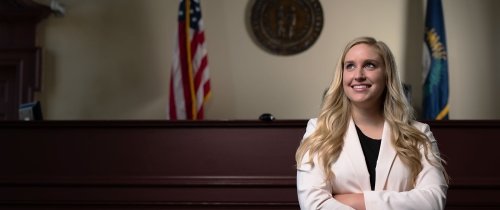
Pre-Law
Centre students excel at the top law schools around the country, with recent grads heading to Harvard, the University of Chicago, Columbia, Duke, Vanderbilt, and Northwestern, among others. A national network of Centre lawyers serves at the ready to help Centre grads find and develop fulfilling careers in the legal profession.
Overview
Justice John Marshall Harlan and Chief Justice Fred Vinson highlight a rich tradition of Centre lawyers serving their communities at the highest level. Today, you will find our alums serving as state and federal judges, partners at top law firms, in-house counsel at Fortune 100 firms, and in governmental agencies and non-profits across the country. Every day, Centre lawyers are impacting and shaping their communities. Centre knows how to train future lawyers and set you on a path to succeed in law school and the legal profession.
Curriculum
No set major or course of study is required for law school. But schools do want to see that you took an academically challenging curriculum. Writing is a critical skill for both law school and as a lawyer, so regardless of your major, you should take a number of classes that will give you experience writing papers with critical reasoning. Many classes in Politics, History, Economics, Philosophy, and English will provide that opportunity.
For specific law-related courses, Criminal Justice Reform, the American Court System, Law & Technology, International Law, and a Supreme Court seminar are all classes currently or recently offered, or planned.
Take classes you enjoy! Many Centre courses have tie-ins to the law.





